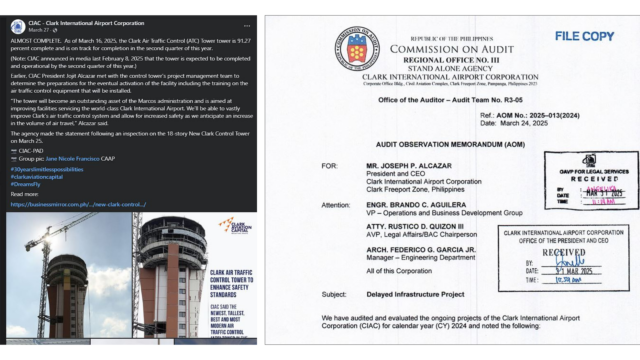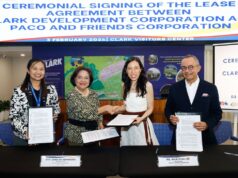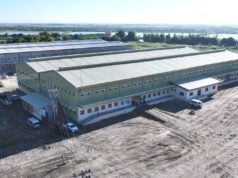CLARK FREEPORT – So, what is the real status of the Clark Air Traffic Control Tower?
In a post dated March 27, 2025 on its social media page, the Clark International Airport Corp. announced:
“ALMOST COMPLETE. As of March 16, 2025, the Clark Air Traffic Control (ATC) Tower is 91.27% complete and is on track for completion in the second quarter of this year. (Note: CIAC announced in media last Feb. 8, 2025 that the tower is expected to be completed and operational by the second quarter of this year.)
Earlier, CIAC president Jojit Alcazar met with the control tower’s project management team to determine the preparations for the eventual activation of the facility including the training on the air traffic control equipment that will be installed.
“The tower will become an outstanding asset of the Marcos administration and is aimed at improving facilities servicing the world-class Clark International Airport. We’ll be able to vastly improve Clark’s air traffic control system and allow for increased safety as we anticipate an increase in the volume of air travel,” Alcazar said.
The agency made the statement following an inspection on the 18-story New Clark Control Tower on March 25.”
SUBSTANTIAL DELAYS
“The completion of the News Clark Air Traffic Control Tower, a critical infrastructure project for the development of the Clark International Airport, remains uncertain due to substantial delays.”
Thus, opened the Audit Observation Memorandum of the Commission on Audit dated March 24, 2025, a day before CIAC’s inspection of the tower.
COA said the setbacks were due to “poor procurement planning, inadequate project monitoring, and potential shortcomings in the contractor’s capability which may not have been thoroughly assessed during the post-qualification process.”
“As a result, the [ATC Tower] has experienced negative slippages and unresolved issues that are crucial for completion and regulatory compliance.”
The notice to proceed with the construction was issued on Jan. 25, 2021, four days after the execution of contract with “original” duration of 365 days, and estimated completion date of Jan. 24, 2022.
“As of this writing [March 24, 2025], the project remains unfinished and significantly delayed despite the revised completion date of Aug. 30, 2024,” COA noted.
This, even as it cited a report of the CIAC Engineering Department that as of Dec. 31, 2024, the project had incurred total cost of P322,615,496.12 representing 91.03% completion.
“However, the estimated final completion date remains uncertain and was not specified in the report,” COA said.
The ATC Tower project had an original contract cost of P290,360,830.70. A variation order of P26,072,817.67 revised the cost to P316.433,648.37 which, with 12% VAT amounted to P354,405,686.17 as COA cited from the report of the CIAC Engineering Department.
The incurred cost of P322.6 million at 91.03% completion is already over and above the revised project cost of P316.433 million.
COA also noted as cause of delay the absence of necessary permits prior to the construction of the ATC Tower, citing that the building, electronic, electrical, mechanical, planning and sanitary permits from the Clark Development Corp., the regulatory authority within the Clark Freeport Zone, were secured only on April 29, 2024.
Also delayed was the issuance of the height clearance permit from the Civil Aviation Authority of the Philippines which is a pre-requisite to the building permit from CDC.
COA pointed out likewise inconsistencies between the actual accomplishments and those reported in the statement of work accomplished from elevators to structural works such as the carpark and canopy and frameworks.
In the wake of these findings, COA recommended to CIAC:
1) enhance project planning by ensuring strict adherence to contractual obligations;
2) require contractors to submit verified monthly progress reports;
3) conduct thorough inspections and validation of all infrastructure projects submitted for billing;
4) impose liquidated damages for delays within the extended deadline of De. 22, 2024, as stipulated in the contractor’s affidavit of undertaking;
5) develop clear and enforceable contractual provisions that define accountability for delays, establish penalties, and implement structured recovery plans; and
6) conduct a comprehensive reassessment of contractor’s technical and financial capabilities to ensure compliance with procurement laws.
CIAC’s reply was requested within seven days from receipt of the audit memorandum signed by State Auditor III Francis S. Mayled, OIC audit team leader, and Director III Teresita C. Guevarra, supervising auditor.
Punto is still seeking to get the side of CIAC as of posting time. Our pages will remain open for their reply.





